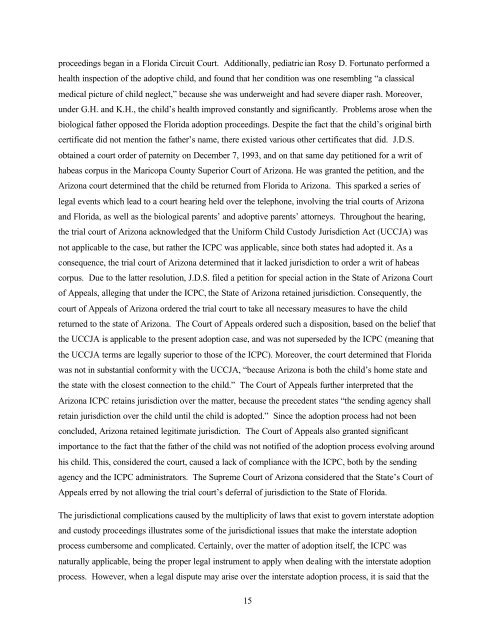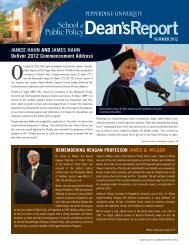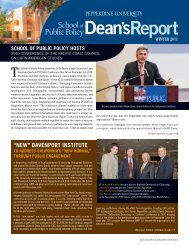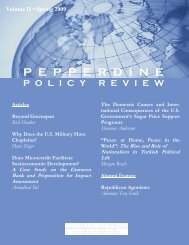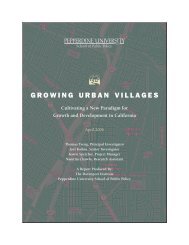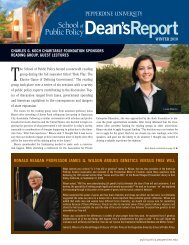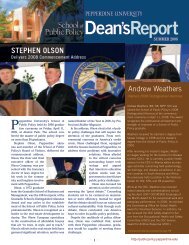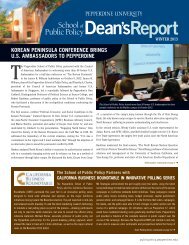Finding Permanent Homes for Adoptable Children - Pepperdine ...
Finding Permanent Homes for Adoptable Children - Pepperdine ...
Finding Permanent Homes for Adoptable Children - Pepperdine ...
Create successful ePaper yourself
Turn your PDF publications into a flip-book with our unique Google optimized e-Paper software.
proceedings began in a Florida Circuit Court. Additionally, pediatric ian Rosy D. Fortunato per<strong>for</strong>med a<br />
health inspection of the adoptive child, and found that her condition was one resembling “a classical<br />
medical picture of child neglect,” because she was underweight and had severe diaper rash. Moreover,<br />
under G.H. and K.H., the child’s health improved constantly and significantly. Problems arose when the<br />
biological father opposed the Florida adoption proceedings. Despite the fact that the child’s original birth<br />
certificate did not mention the father’s name, there existed various other certificates that did. J.D.S.<br />
obtained a court order of paternity on December 7, 1993, and on that same day petitioned <strong>for</strong> a writ of<br />
habeas corpus in the Maricopa County Superior Court of Arizona. He was granted the petition, and the<br />
Arizona court determined that the child be returned from Florida to Arizona. This sparked a series of<br />
legal events which lead to a court hearing held over the telephone, involving the trial courts of Arizona<br />
and Florida, as well as the biological parents’ and adoptive parents’ attorneys. Throughout the hearing,<br />
the trial court of Arizona acknowledged that the Uni<strong>for</strong>m Child Custody Jurisdiction Act (UCCJA) was<br />
not applicable to the case, but rather the ICPC was applicable, since both states had adopted it. As a<br />
consequence, the trial court of Arizona determined that it lacked jurisdiction to order a writ of habeas<br />
corpus. Due to the latter resolution, J.D.S. filed a petition <strong>for</strong> special action in the State of Arizona Court<br />
of Appeals, alleging that under the ICPC, the State of Arizona retained jurisdiction. Consequently, the<br />
court of Appeals of Arizona ordered the trial court to take all necessary measures to have the child<br />
returned to the state of Arizona. The Court of Appeals ordered such a disposition, based on the belief that<br />
the UCCJA is applicable to the present adoption case, and was not superseded by the ICPC (meaning that<br />
the UCCJA terms are legally superior to those of the ICPC). Moreover, the court determined that Florida<br />
was not in substantial con<strong>for</strong>mity with the UCCJA, “because Arizona is both the child’s home state and<br />
the state with the closest connection to the child.” The Court of Appeals further interpreted that the<br />
Arizona ICPC retains jurisdiction over the matter, because the precedent states “the sending agency shall<br />
retain jurisdiction over the child until the child is adopted.” Since the adoption process had not been<br />
concluded, Arizona retained legitimate jurisdiction. The Court of Appeals also granted significant<br />
importance to the fact that the father of the child was not notified of the adoption process evolving around<br />
his child. This, considered the court, caused a lack of compliance with the ICPC, both by the sending<br />
agency and the ICPC administrators. The Supreme Court of Arizona considered that the State’s Court of<br />
Appeals erred by not allowing the trial court’s deferral of jurisdiction to the State of Florida.<br />
The jurisdictional complications caused by the multiplicity of laws that exist to govern interstate adoption<br />
and custody proceedings illustrates some of the jurisdictional issues that make the interstate adoption<br />
process cumbersome and complicated. Certainly, over the matter of adoption itself, the ICPC was<br />
naturally applicable, being the proper legal instrument to apply when dealing with the interstate adoption<br />
process. However, when a legal dispute may arise over the interstate adoption process, it is said that the<br />
15


